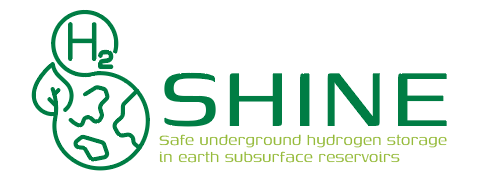PROJECTS ON OFFER
SHINE European Doctoral Network offers 10 research and training projects at PhD level to the selected international Doctoral candidates (DCs-PhDs):
01
UNINA
Quantitative assessment of offshore hydrogen storage: a screening workflow to assess depleted reservoir offshore dataset
Focusing on the characterization and integrity of the reservoir/caprocks using a modelling and geochemical approach to transfer the results into a screening workflow to assess the suitability of porous reservoirs for hydrogen storage.
main supervisor: David Iacopini (UNINA, Italy) david.iacopini@unina.it
ENI, IT
02
UNINA
Impact of subsurface microbiology on hydrogen storage and reservoir storage efficiency
Exploring the fluid, rock and microbial interactions during hydrogen storage using computational and experimental approach to assess the microbial risks during hydrogen storage in porous reservoirs.
main supervisor: Donato Giovannelli (UNINA, Italy) donato.giovannelli@unina.it
ENI
03
UEDIN
Impact of hydrogen injection and withdrawal on the mechanical integrity of reservoir rocks from different geological storage sites.
Focusing on characterization and integrity of the reservoir/caprocks using modelling and geochemical approaches and to transfer the results to assess the security of porous reservoirs during hydrogen storage operations.
main supervisor: Katriona Edelmann (Edinburgh, UK) katriona.edlmann@ed.ac.uk
04
UEDIN
Durability and integrity of well cements and casing under hydrogen storage at the casing-cement-rock interface.
Addressing issues related with leakage risk integrity and monitoring of new and legacy wells using experimental approaches, geomechanical modelling and geophysics/geochemical monitoring tools.
main supervisor: Katriona Edelmann (Edinburgh, UK) katriona.edlmann@ed.ac.uk
SLB, UK
05
TUDelft
Integrated Numerical-Experimental analyses of the safety of porous rocks under cyclic loading
Assessment of caprock and reservoir porous rocks (sandstone) elasto-plastic characteristics under cyclic loading relevant for H2 storage for integrity monitoring.
main supervisor: Hadi Hajibeygi (TU Delft, Netherland) h.hajibeygi@tudelft.nl
SHELL
06
TUDelft
Multiscale modelling and simulation of cyclic storage of H2 in heterogeneous porous rocks
Performing multi-scale numerical simulations to quantify the interaction of H2 with the reservoir rocks and fluids across scales and to test technical feasibility including purity assessments.
main supervisor: Hadi Hajibeygi (TU Delft, Netherland) h.hajibeygi@tudelft.nl
ENI
07
UGA
Permeability and migration pathways to the surface using field observations, laboratory tests and numerical modelling.
Exploring workflows, monitoring techniques and analytical procedures that are able to provide reservoir-scale detection of the hydrogen plume as well as criteria to select to assess leakage risk of subsurface hydrogen storage sites.
main supervisor: Laurent Truche (U Grenoble Alpes, France) laurent.truche@univ-grenoble-alpes.fr
SLB
08
UGA
Modelling and laboratory studies of fluid-solid interaction during H2 transport along fractures
Exploring the consequences resulting from the chemical disequilibrium brought on by potential hydrogen leakage along faults, with a focus to the geochemical and biochemical reactions that may impact the sealing potential of subsurface faults.
main supervisor: Frederic Donze (U Grenoble Alpes, France) frederic.donze@univ-grenoble-alpes.fr
SHELL
09
CSIC
Fault stability and induced seismicity under cyclic injection and production of H2
Use numerical modelling to gain knowledge on the processes that may induce seismicity during hydrogen storage and develop mitigation measures to minimize the magnitude of induced seismicity.
main supervisor: Victor Villarasa (CSIC, Spain) victor.vilarrasa@csic.es
SEISMIK
10
CSIC
Modelling of coupled THMC processes and assessment of long-term caprock integrity
Use numerical modelling to assess the effect of coupled thermo-hydro-mechanical-chemical (THMC) processes on caprock sealing capacity.
main supervisor: Juan Alcalde (CSIC, Spain ) jalcalde@geo3bcn.csic.es
SEISMIK
SHINE TRAINING
Training will involve both private and academic sector partners with the aim of creating a new generation of scientists able to develop technologies, propose new solutions to sub-surface exploration challenges, and provide better scientific understanding and guidance enabling all stakeholders (e.g., policy makers, regulatory authorities, industry, interest groups representing civil society) to frame strategic choices concerning future energy resource options.
The training of the recruited PhDs will be developed at two levels, covering both technical and complimentary/transversal skills:
Local level– the technical skills acquired through the 10 doctorate programmes hosted at the different main beneficiaries. All academic training offered will be recognised by the rest of the partners. Courses taken by a doctorate trainee will be recognised by the host university as part of the ECTS necessary for a PhD degree.
